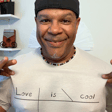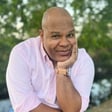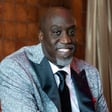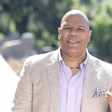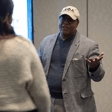Introduction to Gregory Parks and Chapter Culture
00:00:00
Speaker
On the last episode of Ethocast, I dipped my toe into the waters of chapter culture. Let's keep that conversation going. Because the guest on this episode, oh man, he can tell you a thing or two. His name is Gregory Parks. Now you might not know him by his day job, which is Associate Dean of Strategic Initiatives and Professor of Law at Wake Forest University. Now, the way you probably know him is one of his many research areas.
00:00:26
Speaker
fraternal organizations and the law, which includes a pretty deep exploration into the culture of fraternities and sororities at all levels. He's also served as an expert witness in hazing cases. Gregory has written several books, one of which is Brothers and Sisters Diversity in College Fraternities and Sororities.
Focus on Ethical Leadership in Greek Life
00:00:49
Speaker
He is an active member
00:00:50
Speaker
Alpha Phi Alpha and also he holds a JD from Cornell University and a PhD in clinical psychology from the University of Kentucky. Alright let's get into this episode episode Delta of Ethocast with Gregory Parks.
00:01:09
Speaker
Welcome to Ethocast, a podcast about sound leadership practices to boost life in college fraternities and sororities. I'm Eddie Francis, presenter of Followership to Leadership and the Black Greek Success Program, presentations designed to help Greeks become more effective.
00:01:25
Speaker
effective leaders. On Ethocast, I'll share lessons learned from my college days, my career journey, and leadership research. Ethocast is a four-hour edification limited series and presented by Edify Adventures. This is Ethocast, leadership to the letter.
00:01:44
Speaker
Joining me on Ethocast is Gregory Parks, and he's someone whose name you have probably heard. Gregory is a frat brother. He is someone whose work I really, really respect. He's a professor of law, and he is also an author. As a matter of fact, this man writes books like crazy. You know what? He just wrote a book while I was doing this intro. And he's also an expert witness in hazing cases. Hey man, thank you so much for joining me on Ethocast. How are you?
Interdisciplinary Research on Fraternity Culture
00:02:12
Speaker
I'm wild, brother. Good to be with you. Yeah, man, it's good to have you, man. So this is something my wife and I, she's a Zeta. She and I joke about this with you all the time. So we'll be having dinner. I kid you not, we do this. We'll be having dinner. And by the end of dinner, it was like, oh man, parks just wrote another book. Did you see?
00:02:30
Speaker
I got to crank it out. You do crank them out. So the reason I wanted to talk to you, especially in this forum, is that I really want college Greeks to understand what ethical leadership looks like.
00:02:45
Speaker
so that they can have their chapters run in a very substantive way, in a helpful way. And one of the things I mentioned this on the previous episode is I mentioned the importance of understanding the culture of a chapter. This is something you deal with a lot. As a matter of fact, this is kind of how you and I connected because you saw something that I wrote and we just had a really cool conversation about what the culture of a chapter looks like, what the culture of an organization looks like.
00:03:11
Speaker
But I think it's something that a lot of us kind of gloss over in Greek life. And so first things first, let's hear about you. Talk about what it is that we do when it comes to Greek life, but then also in the context of your work, talk about how understanding organizational culture fits into that. Yeah, you threw me off when you said first things first, and my mind automatically went to the notorious BIG.
00:03:39
Speaker
you know, being a hip-hop head. So, you know, my name is Gregory Parks. I'm a professor of law at Wake Forest University School of Law. I've been researching and writing about fraternities and sororities generally for 20 plus years and included in that D9 organizations. As a lawyer, I've grappled with the ways in which these organizations and their members violate the law or what the law means for organizations like this.
00:04:08
Speaker
And as a social scientist, I grapple with a broader range of issues these organizations face and how individuals and groups interact within these organizations and how these interactions affect these organizations' performance towards their ultimate goals or values. And in an effort to make sense of all of that, I've necessarily had to address the set of attitudes, beliefs, rules, systems, and values
00:04:34
Speaker
that influence leaders, members, and employees' behavior within such organizations.
Changing Organizational Culture Beyond Rules
00:04:40
Speaker
So, you know, I have sort of a big picture approach to thinking about fraternities and sororities, and therefore a highly interdisciplinary, multidisciplinary perspective or strategy around how I try to think about them.
00:04:55
Speaker
You know, and I really, that's one of the things I like about what you do is the fact that it is inter or multidisciplinary. You mentioned social science. What are some of the other disciplines that you pull in in your work? So I'm trained as a clinical psychologist and criminal psychologist. But those disciplines really don't answer the big question. So
00:05:19
Speaker
And psychology, I'd say cognitive and social psychology, certainly organizational behavior psychology, sociology, education, student development theory, economics and behavioral economics. Pretty much any social science I think can have something to say.
00:05:45
Speaker
about these organizations and I recognize that I'm not trained in all those disciplines so you know that's the reason why often what you get from me are edited volumes or collaborative co-authored pieces because I'm trying to find people with expertise in different areas that can shed some light on issues and ways in which I can't or I just don't feel like you know spending the next X number of years trying to develop my expertise in that area to give you a
00:06:14
Speaker
paper or chapter or book. So culture, how do you define it? Culture. You know, I think it's embedded in what I just said. It's the set of attitudes, beliefs, rules, systems, values that influence the ways in which leaders, members and employees conduct themselves within an organization.
00:06:40
Speaker
And I think it's important, and thank you for having this conversation, I think it's critical organizations because quite often, whether it be with fraternities and sororities or in other organizational contexts, even here where I work at Wake Forest, whenever we talk about change and addressing some big issue, my rebuttal is always,
00:07:04
Speaker
Too often organizations are thinking about new rules, regulations, policies, procedures, and operations. But if the hearts and minds of the people aren't shifted, your rules, regulations, policies, and procedures won't matter. And so it is really difficult to change how people see the world, how they experience it, how they feel about it.
00:07:25
Speaker
Um, but that really is the rub if you want to address deep issues within any organization or institution. The views expressed on Ethocast do not necessarily reflect the views of the hosts, guests, or any entities with which this podcast's participants are affiliated.
Influence of Known and Unknown Factors on Culture
00:07:43
Speaker
Questions, comments, email eddie at eddiefrances.com.
00:07:48
Speaker
Would you say that a big part of culture is that you have written rules, you have unwritten rules and then you have unwritten unwritten rules and then you have some unwritten rules under that? I mean, it just seems like there's so much of the behaviors. There are so many of the customs that they seem to be moving targets a lot of times, especially from chapter to chapter. Would that be a fair way to characterize some of the culture, at least? Maybe. I mean, I think there's a book
00:08:18
Speaker
I think by Heath and Heath, titled Switch, how to change things when change is hard. And they have a basic thesis that when you want to change something, you've got to be mindful of three things. The rider, the elephant, and the path. The rider is the sort of rational side of people. The elephant is the irrational, the emotional, the subconscious. And the path is how you get from point A to point B. I think what we are often talking about
00:08:47
Speaker
and organizations when it comes to challenges and opportunities as just the writer, you know, what are the sort of rational pieces of the puzzle? Well, if you change this rule from A to B, then, you know, it means the people are gonna change. It doesn't mean the people are gonna change because the irrational, emotional, subconscious side of people is much more influential in their decision-making day to day than the rational side. And then there may be all kinds of obstacles within an organization
00:09:14
Speaker
Um, that just won't allow you to get from point A to B, even if you change the rules. And I think to, you know, um, there, there's sub rules and sub rules. I think the way to put it is, um, what Donald Rumsfeld said years ago, who in Donald Rumsfeld was, uh, what was the secretary of, um, um, defense with secretary of defense under Bush.
00:09:39
Speaker
And he said there are no knowns, there are known unknowns, and there are unknown unknowns. I remember when he said that, yeah. Yeah, the known knowns are the things we know that we know. And that's what I think organizations usually are dealing with. And then there are known unknowns. There are things that we don't, that we know that we don't know or understand. And the unknown unknowns are the things we're not even aware of that
Meaning and Identity in Greek Organizations
00:10:02
Speaker
exist. Yeah. And those are the biggest and thorniest issues. If you're not aware of them, you don't know how to tackle them as
00:10:09
Speaker
as a old cartoon that you and I probably are aware of that some of your listeners might not be as GI Joe whenever they do their public service announcements uh... on the cartoon they'd say now you know and knowing it's half the battle but if you have no idea that an issue is out there or a set of dynamics are out there then you have no hope in and actually tackling it and so i think if you stitch all these things together that that tells you what the culture of an organization is and why it's so difficult to
00:10:39
Speaker
address the culture when the culture is problematic for the sustainability and longevity of an organization. And what this makes me think about is something that I mentioned on my previous episode.
00:10:50
Speaker
is that a lot of times for us when we join these organizations or any kind of organization, even if it's a job that we select, if it's a church that we go to, if it's a professional organization that we join or any kind of, you know, family unit that we decide that we are more attached to, you know, the aunts and uncles or whoever.
00:11:12
Speaker
It seems to me that a lot of times what's going on is that we're all searching for some sort of meaning in these associations. And so when you have someone who says, OK, well, yeah, I know what the rules of my frat are, but here are the rules of my chapter, and I like these rules. It seems like what's going on subconsciously, and this is neither a good nor a bad thing.
00:11:39
Speaker
It seems like what's going on is that that that member is looking for some sort of meaning in what they're doing. Even if it's something that is illegal, even if it is something that's unethical, there's still a sense of meaning. Is that is that something that you think kind of plays into this? Yeah, definitely. I mean, we all have social identities, meaning our identity is rooted in social groups that we're a part of. And the truth of the matter is in any organization,
00:12:09
Speaker
Your identity, yeah, as in part tethered to that national and international component or the highest level component. But your day-to-day interactions are not with a national international component. It's with a more local component. And so, you know, there's this whole research and organizational behavior on organizational commitment. And an employee at a major corporation, you know, let's say Google, yeah, they may be committed to Google
00:12:39
Speaker
They're going to be more committed to the people who they see every day, who they work with, right?
Challenging Unjust Rules and Leadership Comparisons
00:12:45
Speaker
Because that's where the real relationships are made. And I think often if a person believes that doing A makes that organization better, even though the organization wants it to do B, one, they can only see what they can see at the local level.
00:13:06
Speaker
And two, sometimes maybe they're right. Sometimes in an organization the same as in society, pushing back against rules, archaic rules, is actually in the best interest of the organization, even if the organization doesn't see it that way. And sometimes that necessitates, honestly, breaking
00:13:29
Speaker
maybe what you might see as an unjust law, right? You know, if we have racial segregation and Martin Luther King says, you know, we're gonna protest for integration, we're gonna have Rosa Parks sit at the front of the bus, we're gonna, you know, engage in X, Y and Z practices. Yeah, you might get locked up because it's against the law, but is the law or the rule proper law or rule to have on the books? And sometimes it's not.
00:13:54
Speaker
Yeah. You mentioned, uh, our associations with people and how we align ourselves with other people. And this is something I learned when I was a job recruiter. And a lot of times when I would talk to a hiring manager about bringing someone in or the candidates that I'm talking to, I'm really listening to the hiring manager because I'm sitting there going, well, if, if I go out and bust my tail to go out and find the best possible candidates I can find,
00:14:23
Speaker
One of the things I learned is, and it's an adage that we see in here all the time, is that when people quit jobs, they're not really quitting the jobs, they're quitting people. They're quitting bad leadership or they're quitting people who they just don't fit the culture of the place. And they're just quitting the people who create that culture a lot of times. And so that's a really interesting point.
00:14:48
Speaker
listening to Ethocast. I'm Eddie Francis and we're talking to Gregory Parks and Greg is a professor of law, but then also he's an author and he's an expert witness when it comes to hazing cases. So chapter level, chapter level, as you and I know, is the entry point for folks when they get into Greek life, regardless of the type of fraternity or sorority. When it comes to a chapter,
00:15:16
Speaker
How does the I was going to ask you about how the chapter culture is formed but it's kind of a chick that seems like a chicken or egg thing to me, but When it does come to the chapter level i'll ask you this way What is it about the culture of a chapter versus the culture of a national organization? That can be either that can be really different at times What have you seen in your research and your or your studies?
Franchise Model vs. Diverse Federation in Chapters
00:15:43
Speaker
Well, I think it depends on whether the
00:15:46
Speaker
the general organization of a fraternity of sorority sees its chapters as franchises, or as our frat brother Lawrence Ross, I think has said before, a loose federation of entities. I think he said that, and I don't want to misattribute anything to him. If the national organization sees the chapters as franchises,
00:16:17
Speaker
for the most part, every chapter looks alike. There might be some minor influences given the cultural dynamics on that campus, an HBCU versus PWI, a large state school versus an Ivy League or a small liberal arts college. But by and large, they look the same. If it's a loose federation, then you go from chapter A to chapter B and
00:16:44
Speaker
You might want your child to join at chapter A, but when you see chapter B, you might say, no, this is not. This is inconsistent with what I might have imagined the organization to be. And it's something that we talk about in marketing. You can either be the office on campus that has the special sauce, and you put the special sauce on top of the patty or underneath the patty. We don't care where you put the special sauce, but you better have the special sauce on that burger.
00:17:13
Speaker
we look at your burger and it's a, it's a smooth bun and not a sesame seed bun. It's like, Oh wait, that's a sin because we all talk about having special sauce on a patty with the letters, the cheese and the sesame seed. So yeah, what are we, are we doing the special sauce thing? Are we doing a whole nother type of burger thing? Yeah. I hear you. I hear you. Yeah. I think some of the issue also is I sense in many fraternities and sororities,
00:17:41
Speaker
And certainly in D9, we talk around issues. We talk about an issue, but we don't get to the heart of it. As we say in Alpha, the seven chapter of our history book, the leaven of self-examination, organizations, I think, often resist soul searching. Because soul searching would necessitate and ultimately result in unearthing things that
00:18:08
Speaker
the members and maybe the most powerful members they don't want to have to confront we don't like to soul search individually for ourselves cuz we hurts now i mean as someone who
Impact of Traditions and Dynamics on Chapter Culture
00:18:19
Speaker
uh... you know background clinical psychology up done therapy you know provided therapy for people most people even with big issues they don't go to therapy when they do they don't last and even if they last it's hard to peel back the layers of that onion and it's the same thing with an organization an organization is simply
00:18:36
Speaker
an aggregate mixture of its various members, and if members find it hard to do that individually, it's not surprising if the organization finds it difficult to do that as well. Which means when there are caustic elements to the organization that are part of its culture, either writ large or at chapter levels, you don't get the chance to truly uproot those things because the organization just isn't at a place in which it really wants to grapple with
00:19:05
Speaker
with the root issues. So what, what are some of the things that can really, really, what are some of the things that can really, uh, compromise the culture in, in either direction? I mean, if it's a great culture, we can really throw a culture of a chapter off, regardless of the type of organization, NPAC, Panhell, IFC, whatever, it doesn't matter. But,
00:19:34
Speaker
What are some of those things? And if you are talking about a culture that's not so great, what is something that disrupts that negative culture and maybe moves it in a more positive direction? What kinds of elements do you usually see? Yeah, I mean, I think there are various pressure points. So let me tackle the first question in the second. And these may mean different things and different
00:19:58
Speaker
organizations, whether they be NPHC, NIC, NPC, NAFO, so on and so forth. One is just the old heads from the chapter. And they may have more influence in an organization where the vast majority of members are alumni members and college members. The broader campus dynamics, the ideas and attitudes of the most influential members or leaders in the organizations, traditions of the chapter.
00:20:26
Speaker
Um, prevailing societal attitudes about something, uh, the ceremonies and rituals, um, that the chapter engages in could be organizational policy. Some of the unofficial ceremonies and rituals could be official or unofficial. Yeah. Yeah. You know, it depends on what your ceremonies and rituals, what kind of values they're trying to articulate and how they're being reinforced. If they're not, you know, robust,
00:20:56
Speaker
ideals and rituals and ceremonies and they're not being reinforced in various ways you can't be surprised if they're not inculcated and the members groupthink amongst members of the chapter right the idea that groups engage in poor decision-making and even where there are dissenters the dissenters either don't have a voice so they're scared uh... speak up
00:21:21
Speaker
whether you have strong top-down leadership and what the top-down leadership says and the extent to which intimidation and threats, as I say, sort of in the context of groupthink, push members who might be divergent thinkers either to fall in line or to fall by the wayside. And so then the question becomes, what does it take
00:21:49
Speaker
to disrupt a negative culture, it takes disruptors,
Role and Resistance of Disruptors in Organizations
00:21:54
Speaker
right? It takes people who think differently than what the prevailing norm is within the organization or chapter. But quite often, unless you're part of an organization, it takes a lot to be a disruptor. I was going to ask you, is it too dramatic to say that it takes bravery?
00:22:20
Speaker
it's no it it takes that it takes you gotta be noble true and courageous to uh... to be a disruptor people hate disruptors even when they know the disruption is necessary right think about collin capernet uh... i think most people recognize especially those on the left that he he had a righteous cause but there are many who still irritated with them there's a there's a body of researchers shows that
00:22:51
Speaker
that folks may like activists to a certain extent, even when those activists are aligned with those people's values and the issue they want to take up, but an activist necessarily has to push you beyond your comfort zone. Yeah. Well, this, this goes back to the story of the, what was it? An old lady who stabbed Martin Luther King. I mean, I knew he was doing the right thing, but she was getting pushed way outside of her comfort zone and, and she just wanted him to just stop it clearly.
00:23:22
Speaker
Yeah, yeah. And so organizations that are storied and historic like fraternities and sororities, many of them have been around generations, if not hundreds of years. I think for many, even as they may say and desire to tackle certain critical issues that the organizations need to tackle to have longevity, sustainability and impact,
00:23:51
Speaker
what it truly will take is something that I don't think most members or leaders can contemplate. And so when there are those who come along, let's just say in a chapter and a chapter has serious alcohol and hazing problem. And you've got a member of the chapter who comes along and says, you know, we can't be the young men that we say we need to be in this organization.
00:24:18
Speaker
And we've got to stop this. And I'm here to be the voice of conscience in the chapter. What's most likely to happen is that person is going to be ostracized. And I'd like to say you're only going to see that amongst 19 to 22 or 23-year-olds, but it probably is even more exacerbated amongst organizations that have alumni chapters.
00:24:43
Speaker
Because if you're 30 40 and 50 you're probably even more set in your ways than you were when you were 21 take you from a chapter president. Yeah But getting back to your question If you if you want disruption positive disruption, you need disruptors But somehow those who are really committed to change They've got to support disruptors even if they're not disruptors themselves. Maybe that that's not
00:25:12
Speaker
They don't see themselves in that way. They've got to find ways to support disruptors in their organization where the organization needs some kind of fundamental change in order to be sustainable and have a lasting, if not ideally, a growing impact in the spaces and places in which the organization operates and the lives of its members and hopefully in the lives of individuals in the community.
00:25:37
Speaker
You know, those of us who have been, I've been a campus advisor before, and that was some pretty hard work. And the chapter I was an advisor for was small. I mean, I'm talking fewer than 10 brothers. But we look at something that the chapter is doing.
00:25:57
Speaker
You know, we're professionals and we can see stuff coming from a mile away. Right. But yet I remember when I was an undergrad and when I was an undergrad, I didn't see it coming from a mile away. But there were times that my gut told me something and I did not listen. Right. And so.
00:26:15
Speaker
When is it realistic to expect college students to recognize when it is time to be a disruptor when it is time to create a better culture within a chapter.
00:26:30
Speaker
How does that go for college students, especially when there's a new line coming in, a new membership class coming in, and you know they're going to change the culture somehow, some way? Is it reasonable to expect college students to push back when something not so great is happening or to keep it going, to keep carrying the ball when something great is happening with the chapter? No, because new members of fraternities and sororities
00:27:00
Speaker
and especially when you're talking about college members, they're only gonna be on that campus, but at the most, a few years, they don't know but what you teach them. And so if you've got a two-weekend, three-weekend process, I'm not knocking the length, but if your process is basically, here's a history, here's a basic history of the organization, here's a basic structure of the organization,
00:27:27
Speaker
Here, you know, don't haze. And, you know, here's some basics on how to run your chapter. You know, those are the basic guideposts. But if they don't know what the main issues are that the organization faces and has faced for arguably a protracted period or the new issues before the organization or the issues on the horizon,
00:27:55
Speaker
and what it really will take to address that, I don't see how you could reasonably expect, I don't see how you could reasonably expect a new 30 year old, 40 year old, 50 year old alumni member to be an effective organic problem solver in the organization, let alone someone who's 19, 20, 21. If you want better members, meaning at least in this respect, if you want members
00:28:25
Speaker
who once they join they can be organic problem solvers help solve problems where they are you gotta teach what those problems are you gotta give the tools necessary to address the problem but again i i'll circle back to eleven self-examination if you only tell them what the surface level problems are you'll get at best surface level solutions the only way you get
00:28:53
Speaker
system-wide change is if the organization is ready to be honest with itself and with its established members and new members about the breadth and depth of challenges the organization faces and what it's truly going to take, not in the short term but over the long term, to address those challenges.
Need for National Support and Evolving Views
00:29:15
Speaker
And again, I think the reason you don't have that is in part
00:29:21
Speaker
Or the power brokers don't know what the root issues are. And sometimes they do. Sometimes they're the root issue. Powerful people don't want to give up power. And I think sometimes when they realize we all have a role to play in the problem and its solution, sometimes powerful people just don't want to relinquish what they have.
00:29:49
Speaker
They they create a culture in which big issues really ignore And that's and that's bigger than the chapter dynamic, but I think it's central right? I mean a chapter is I'll have to make a distinction between progressive and conservative thinking around for really really light. Yeah. Yeah, go ahead, please There's a whole body of research on how liberals and conservatives differ from one another psychologically
00:30:17
Speaker
and we know historically conservatives tend to uh... they believe the state's rights right like pumped to the states given the tenth amendment and liberals are like there's some issues that are so beyond the state that reverberate beyond the state or are bigger than what a state can handle uh... or the state's going to do the wrong thing that the federal government needs to come in and and intervene and provide resources necessary to address a systemic problem and i
00:30:47
Speaker
I think about fraternities and sororities the same way. I mean, they're those who say that, yeah, those chapters out there, they've got a problem and they need to figure it out. But sometimes those issues are so long standing and so systemic that they're beyond the realm of what 10 guys or young ladies or 100 guys or young ladies in a chapter can actually solve. It necessitates the international organization bringing to bear the resources, whether it be financial
00:31:15
Speaker
human capital intellectual capital to truly solve uh... abroad systemic problems because the culture that's doesn't seem to reside in the and the chapter the cultures really the culture organization how do new members change the culture of a chapter i think new members today likely become more liberal on how they think about issues especially social issues uh... and they also are likely to think about
00:31:44
Speaker
uh... faith and family and fun and finances and communications and sharply different ways as the years go by because younger generations simply think about those things in different ways than older generations uh... these organizations are likely and to undergo radical changes in how members new members specifically uh... think about themselves how they think about themselves situated in the world within these organizations
00:32:13
Speaker
But we don't talk about it again, so I don't imagine that so I imagine at some point these groups will look up and see themselves Nationally or internationally as far afield from what their founders intended them to be right and so you take the average 20 year old or 19 year old and bring them into an organization or bring her into an organization They're different than a 19 year old was 50 years ago and
00:32:41
Speaker
It's just their life experiences and technology and who they associate with and how they view the world and they bring all that with them to an organization. And again, if you are loose federation chapters and not an international franchise, they can have substantial influence over how that local chapter operates and looks in ways that are very different than what, again, I think most importantly, the founders of the organizations may have intended for
00:33:11
Speaker
chapters and members to look like or behave fine. So we know that if a chapter really wants to trend in a productive direction, they are
00:33:21
Speaker
They are meeting whatever the touch points are for making sure that the mission is satisfied of the fraternities sorority. They are executing the national projects or the philanthropies or whatever it is that they have. And of course, they are getting their GPAs and doing all of that good stuff, the stuff that they really need to do to make sure that they do their part.
00:33:44
Speaker
to keep their fraternities and sororities going. So, you know, we want to have that. Where does the chapter begin? You know, if they are saying, okay, we got to right this ship. Where do they begin to create that more productive culture? Or if they do have a productive culture, how do they make it better?
00:34:11
Speaker
I think the first step is really understanding their ritual, their mission statement, and the early history and intentions of their founders. As time goes on, and you see this with faith and reconciling it with modernity, there are foundational principles, and how do you make sense of those foundational principles even as time marches on? The principles shouldn't change, though how they get applied may be different than how they're applied
00:34:41
Speaker
decades ago, just because you've got new challenges and opportunities. I think a chapter has to look to the resources they have on their campus, student affairs and Greek life, whether that be education training, advising, to help, because I think most universities at least want to, they may not actualize it, but I think they want to have healthy and robust chapters on their campuses.
00:35:10
Speaker
I think that a chapter should look to if they've got an alumni advisor or advisory team, how that person or that group of people can help them, but also the general organization has to be willing to support advisors. You were an advisor. I was a chapter advisor. In Alpha, I'd say this, it's the hardest job in the fraternity. And many organizations, you get no support.
00:35:40
Speaker
that you've taken on the hardest job, you get no support. I think old heads can play a critical role. They can play a negative role, but they can also play a positive role because they've got institutional memory vis-a-vis the chapter. And also, if they're doing what they need to do, they have human intellectual and financial resources to pour into the chapter and its members
00:36:06
Speaker
And then I think the members have to demand the best from the general or national or international organization. The organization lives off of the financial resources of the members. And I think there, at the very least, there's an implicit contract that if we're giving you our money, then we need something in return. And that is we need the support necessary to thrive, not just limp along, but we need the resources necessary to thrive in some
00:36:36
Speaker
objectives objectively measured way uh... the hard thing is that means that a nineteen twenty twenty one-year-old has to be a very strong advocate for themselves sometime within and against systems paper at their best interests at heart but how they conduct themselves not necessarily uh...
Leadership Development vs. Officer Training
00:37:03
Speaker
you know quote-unquote adults you know technically a eighteen-year-old twenty two-year-olds an adult but they need thirty forty fifty-year-old members who are invested in the best for and of uh... college chapters to be willing to be advocates on their part i think if you can pull all these pieces together i think we find very healthy and vibrant college chapters they probably have a lot of these elements
00:37:30
Speaker
combined, where you see chapters dying on the vine, they probably don't have any of these components. And not certainly in a way that you would think should be brought to bear if a chapter is to be healthy and vibrant. I'm going to end with this.
00:37:52
Speaker
We've seen, we've seen fraternities and sororities of all types really lean into leadership training. And we know that something that has to happen.
00:38:07
Speaker
do you think it looks like when that leadership training is productive and, and, you know, just, it looks like, it looks like the, the fraternity, the sorority is hitting on some good cylinders and you, you see the, you see the young men and women who are members of their chapters and you're going, okay, it looks like they were picking some things up. What does that look like when they are able to,
00:38:36
Speaker
really take whatever training that they got and they were able to put it into action. What does that look like to you? Well, one, I think there's a difference between leadership training and officer training. You can be a leader and not be an officer. And you can be an officer, not an effective leader. You're just a person with a position or a title. And so I think organizations
00:39:04
Speaker
Well, let me say this. I think when your organization is 99% college members, you think about investing in college members differently than if your organization is 10% college members. But if at the end of the day, all of these organizations were founded on college campuses for and by college students, it doesn't matter if 90% of your members or 1% of your members are alumni, your purpose is to invest
00:39:34
Speaker
and the next generation of members.
Episode Wrap-up and Engagement with Ethocast
00:39:38
Speaker
And so, yes, they need to know how to run a chapter, the basic and technical duties of specific officers. They need to know the ritual, the mission statement, and the governing documents, Constitution and bylaws, because they need to know the principles upon which the organization is founded and perpetuated. But they also need to know how to influence
00:40:03
Speaker
They also need to know how to move people along around a common cause on the most critical issues that the organization, whether it be at the international level or the local chapter level, must face. And so it necessitates a depth of understanding of the broad range of issues that organizations need to face. And then lastly, a good leader knows him or herself.
00:40:28
Speaker
And so when you're talking about college students, they need to know about student development theory. They need to understand how they're thinking or why they're thinking about race and moral judgment and sexual and gender identity issues and leadership and core critical issues that their chapter may be facing, how and why they're thinking about them the way they are.
00:40:57
Speaker
chart, chart the best path. And that is, um, is being able to lead themselves before they lead anybody else. Hmm. Gregory parks. He is a professor of law and also he is an author and he's an expert witness when it comes to Greek life and hazing. And, uh, man, thank you so much for joining me on Etho cast. This was a great conversation. Appreciate you. Good to be with you brother. Appreciate you. Take care.
00:41:22
Speaker
Ethocast is a four hour edification limited series. If you like what you heard, like and follow this podcast for more leadership insights for your fraternity or sorority chapter. To find out how you can bring followership to leadership or the Black Greek success program to your campus or a campus near you, email today at ediefrances.com. Until next time, spread brotherly and sisterly love wherever you go.


